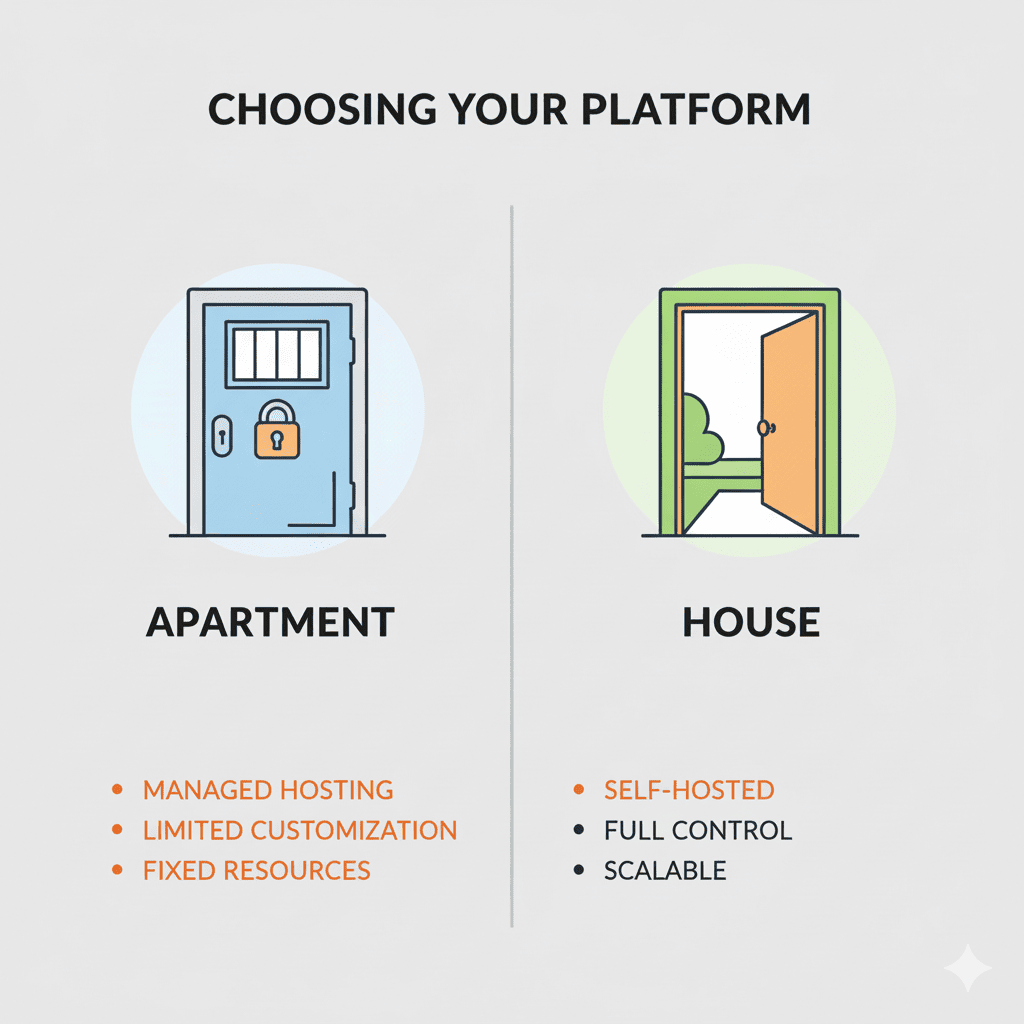When I first started my website, I was so excited. I had a great idea and a passion to share. But then I hit my first roadblock: I saw WordPress.org and WordPress.com. I thought, "They're the same thing, right? One is just the website, and the other is a special type of website." I'll be honest, I was completely confused.
I remember spending a whole afternoon just trying to figure out which one I was supposed to use. It felt like I was choosing between two identical paths, but with a nagging feeling that one of them was a dead end.
I quickly learned that this wasn't just a small detail; it was a fundamental decision that would affect everything about my website, from how it looked to what I could do with it. My personal journey through this confusion taught me a lot, and I want to share my insights with you, especially if you're a beginner just starting out. I'll explain what I learned, using simple terms and real-life examples.
My "Aha!" Moment: The Apartment vs. The House
The best way I've found to explain the difference is by using a simple analogy. This is what finally made it click for me.

WordPress.com is like renting an apartment. It's easy, convenient, and the landlord (WordPress.com) takes care of everything for you. You don't have to worry about maintenance, security, or the building's infrastructure.
You can decorate your apartment, but you can't knock down walls or add a new room. It's a great solution if you just want to move in and start living without any hassle.
WordPress.org is like owning your own house. You have to buy the land (web hosting), get the tools (the free software), and build the house yourself. This means you are responsible for everything—the electricity, the plumbing, and all the design choices.
While it requires more work, you have complete freedom to do whatever you want.
You can build a new wing, add a second story, or even turn it into a shop.
Once I saw it this way, the confusion vanished. It became a simple choice: Did I want the ease and simplicity of an apartment, or the freedom and control of a house?
My Experience with Each: The Good and the Not-So-Good
I've personally used both platforms, and I've seen the pros and cons firsthand.
The WordPress.com Experience
I started with a free WordPress.com site for my first blog. It was perfect for me at the time.
The Best Part: I was up and running in about 15 minutes. I didn't have to deal with buying a domain name or figuring out hosting. The dashboard was clean and easy to use. I just focused on writing my content, which was all I wanted to do.
The Catch: I quickly hit limitations. I wanted to add a contact form, but I couldn't unless I upgraded to a paid plan. I also couldn't install any custom plugins to add more features. My site's address was "domain.wordpress.com [a subdomain]" which didn't look very professional, and there were ads on my site that I had no control over.
For a hobbyist blogger or someone just testing an idea, I believe WordPress.com is a great starting point. It's a risk-free way to learn the basics.
The WordPress.org Experience
After a few months, I knew I was serious about my blog and wanted more control. I made the switch to a self-hosted WordPress site.
The Best Part: The freedom was incredible. I could install any plugins I wanted. I added an e-commerce plugin to sell some of my art prints. I used an advanced SEO tool to help my articles rank higher in Google. I chose a unique theme that made my site look exactly how I had imagined it. My site's URL was now just my own domain name, which felt so much more professional.
The Catch: It was a bit more work. I had to buy a domain name and a hosting plan. My hosting provider, Bluehost, made it easy with a one-click install, but I still had to learn about things like backups and security updates. I felt a little overwhelmed at first, but with so many online tutorials and resources, I found my way.
My Actionable Advice for You
If you're still on the fence, here's my simple advice, based on my own experience and what I've seen with others.
If you're a pure beginner and your goal is just to write: Start with the free WordPress.com plan. You can always migrate to a self-hosted WordPress site later. This lets you get a feel for the platform without any financial commitment or technical headaches.
If you plan to build a business or a site with unique features: Skip the middle step and go straight to WordPress.org. The initial learning curve is worth it for the long-term freedom. You'll need to buy hosting, but many providers have affordable plans specifically for WordPress users.
Final Thoughts
The decision between WordPress.org vs. WordPress.com is about your goals. I've seen so many people get stuck on this step, but it's really about choosing the right tool for the job. Do you need a simple tool for quick tasks, or a powerful tool for building something bigger? I'm so glad I made the switch to self-hosted WordPress because it gave me the freedom to grow and build exactly what I wanted.
So, I invite you to think about what you want your online presence to be.
If you're a beginner, don't be afraid to start simple. If you have big dreams, embrace the power of WordPress.org.